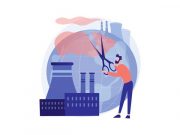As Kabul falls, the burqa shops of Afghanistan get busy
By Ruth Pollard
AS THE TALIBAN entered the Afghan capital of Kabul on Sunday, university lecturers gathered their female students for some final goodbyes. Telling the shocked young women “we may not meet again,” the lecturers, along with everyone else, were evacuated, and the universities, along with schools, offices, and shops, were shuttered.
Growth and long-term energy supply
By Bienvenido S. Oplas, Jr.
The 11.8% gross domestic product (GDP) growth in the second quarter (Q2) 2021 was celebrated with fanfare by the government and the ruling political party as “proof” that they are doing the right thing in guiding the economy out of prolonged recession. But this is not a good way to look at it.
Inclusive economics
By Filomeno S. Sta. Ana III
Action for Economic Reforms (AER) will soon commemorate its 25th year. It was incorporated as a non-stock, non-profit organization in November 1996. Since the pandemic will not go away soon, AER has opted to do away with the fanfare for its silver anniversary. Instead, it has opted to have low key but meaningful activities.
You thought this was just about Afghanistan? Think again.
By Ruth Pollard
THE SPILLOVER has already begun, before the Taliban have even reached Kabul. City after city is falling as the Islamist insurgents draw closer to the capital. And it will only get worse from here as the conflict expands beyond Afghanistan’s borders.
Save the restaurant industry
By Andrew J. Masigan
The last 18 months was a “trial-by-fire” for the local restaurant industry. With government imposing the world’s longest, most stringent lockdown, restaurant operators found themselves with a mountain of obligations without the sales to back them up. Those with sufficient cash reserves were able to survive the onslaught but the thousands without ample cash runways had no option but to close permanently. Along with business closures came hundreds of thousands of lost jobs.
The present is challenging, but the future offers hope born of innovation in healthcare
By Vincent Chin
THERE ARE CLOUDS overhead in Southeast Asia, as fresh COVID-19 infections and new variants drive rising cases and lockdowns in countries like the Philippines. But despite the current challenges, there is welcome light on the horizon as we look beyond the COVID-19 pandemic. In “The COVID-19 High-Wire Act Continues, But So Too Does Opportunity,” the Boston Consulting Group (BCG) explores the potential revealed through encouraging innovations emerging from a challenging 18 months.
Economic growth, a question of anchor
By Diwa C. Guinigundo
All the broadsheets bannered that the Philippines’ second quarter real GDP growth of 11.8% ended the recession here, representing the fastest pace in 32 years. That was a big relief to us because if this momentum is sustained, we should see the revival of business activities, opening of more jobs, and reduction of hunger and poverty in the land.
Disorder and confusion
By Luis V. Teodoro
Only the words “disordered” and “confused” can do justice to any attempt to describe the state of Philippine governance, politics, and society in these last 10 months of the Duterte regime, and more than a year after COVID-19 began tormenting these troubled isles.
Decarbonization can create growth opportunities
By Gina Yu-Aquino, Dale Hardcastle and Torsten Lichtenau
THE CARBON TRANSITION is accelerating, and every company needs to play a role.
As Singapore opens, its social divisions aren’t so clear cut
By Daniel Moss
SINGAPORE has declared its intent to begin putting the pandemic behind it and rebrand as what the health minister calls a “COVID-resilient nation.” Dismounting from the carousel of closures and reopenings is going to be tough — the city state has had a few false dawns. Even harder will be papering over the social and economic divisions that have deepened because of the disease.
Rethinking Finance: Are banks doing enough in the time of COVID?
By Daniela Luz Laurel
The title of this column, “Rethinking Finance,” was born out of my obsession during the 2008 financial crisis with trying to make sense of how and why the financial industry became so greedy that it led to hundreds of thousands of people losing their jobs.
The worst is yet to come?
By Marvin Tort
Just as our economy was showing signs of recovery, with GDP growing 11.8% in the second quarter, COVID’s Delta variant started hitting us hard. As of Aug. 10, the total number of active COVID-19 cases nationwide was over 79,000. Just a month before, July 10, we were at around 49,000 cases. The big rise in numbers seems linked to the highly transmissible Delta variant.

















